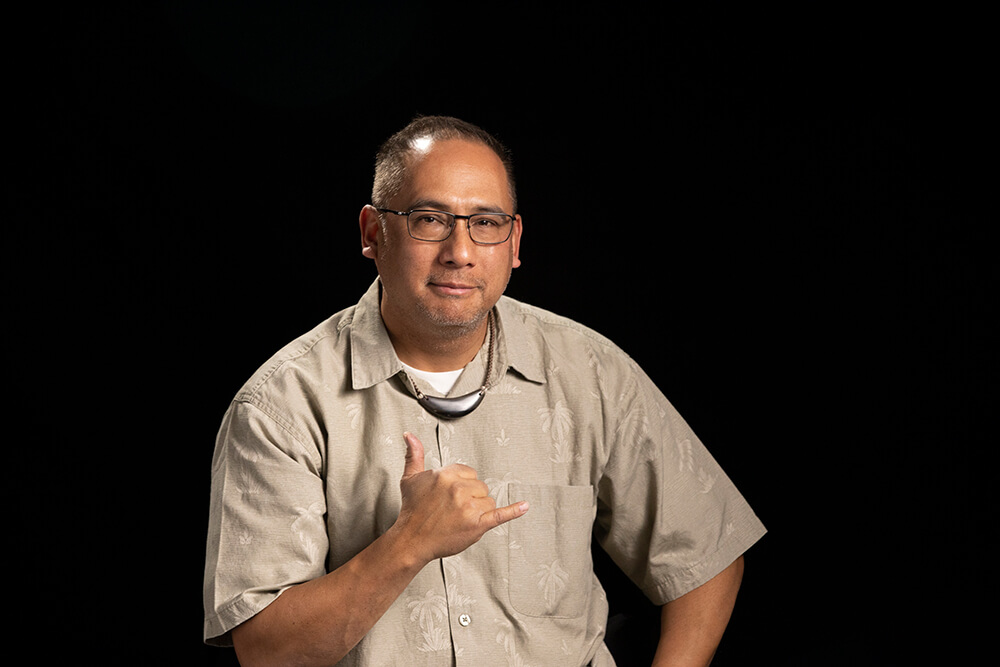Mike Perez
Sociology professor and faculty athletics representativeAnti-racism is:“The active engagement to resist, eradicate and transcend racism directly and/or indirectly in all its forms, from individual levels of hate to ideological and systemic racism; through critical education, authentic allyship, and talking story to spark connection across diverse histories, identities, lived experiences, and social locations.”
My Dad’s Stories Kept Me Safe and Street Smart
"The Talk Continues……."
Dangkalo na Si Yu'os Ma'åse for continuing this anti-racism space and thoughtfulness to avoid tokenizing educators of color with the responsibility to educate the majority.
I identify as a first-generation college student, cisgender male, Indigenous/Native Pacific Islander, and diasporic Chamoru, ancestrally rooted to the Island of Guam/Guahan; born in (Westside) Long Beach, California, and raised in Southern California in a working-class family. Both of my parents are Chamorro from Guam. Traveling to and from Guam most of my life and living on the Island in the 1990s, where one of my four daughters was born, I have a deep connection to our Island - personally, historically, politically and academically.
These are the multiple foundations in which I talk story and share my journey from a place of allyship, empathy and authentic anti-racist change.
Long before I set sail on an academic career and engaged in critical race studies, I often had "The Talk" with my dad. It is an honor to talk story about him in this anti-racist light, having lost him a year ago almost to the day. Two of his stories especially resonate.

The first story, which I call “Island Army Boys Bar Altercation,” I heard when I was 9. This took place in North Carolina in the mid-1960s when he and fellow servicemen, all Chamorros, went to a bar. Dad said, as island boys away from home for the first time, “We didn't know what racism was.”
Dad and his che'lus/brothers were attacked, called “straight-haired N-word” and denied services. There was a brawl, resulting in Dad and his friends fleeing the premises and getting their car window shot out.
A second story, which I call “Diving Boricua Boys,” occurred when Dad was on Army rest and recuperation in Puerto Rico. He was shocked and angry to find white military servicemen throwing nickels and dimes off the dock into deep water. They would watch in amusement as young, impoverished Boricua boys dove to the depths to retrieve the coins.
These are among the stories my dad shared with me. As I think about him now, I appreciate the restlessness in his voice through the years.
I, too, have had similar experiences with racism. One incident in particular happened when I was a teenager in the 1980s. I was driving home from a night shift at Baskin-Robbins on the border of Cerritos, Lakewood and Hawaiian Gardens in my lowered Volkswagen Beetle when I was pulled over by a handful of police vehicles, guns drawn. I was ordered to place my hands on the wheel and exit the vehicle slowly with my hands raised.
After being held for about an hour, the ranking officer on the scene politely informed me they thought I was a suspect in a robbery that just went down. I fit the description – “young ‘Hispanic’ male driving a lowered VW bug.” Several of us in that area could have easily fit that description.
I was held for a couple of hours, harassed and mildly roughed up. Later, my mom was outraged and wanted to file a complaint, but I asked her to leave it alone.
I often think about my dad, our experiences, his wisdom and the love underlying his traumatic stories to make me street smart and safe.
His stories helped me maneuver in the neighborhoods where we often hung out with Latinx, Black, Polynesian (predominantly Kanaka Maoli and Samoan), Filipinx and working-class white friends.
I appreciate that things have changed in meaningful ways toward greater social consciousness. The fact that oppression is still alive and well is troubling, but not surprising. As a sociology professor for over 23 years at Cal State Fullerton, my commitment to sparking change through critical education is especially passionate now, as I remember my dad.
Like my dad, I have multiple identities that come with visibly living as a person of color whose racial category is unclear at first glance. It is my combined visibility and invisibility at the intersections of multiple marginalities that serves as a place of empathy and hope that allies from all identities, intersectionalities, and walks of life can come to a place of meaningful solutions toward real change.
Michael P. Perez is a first-generation college graduate, native diasporic Chamorro/Chamoru ancestrally rooted in Guam and born in Long Beach, California. He is a professor of sociology and faculty athletics representative at Cal State Fullerton. His teaching and research interests include critical race studies, race, ethnic and Indigenous relations, Native Pacific studies, sociology of sports, social justice, education, and critical pedagogy, deviance, and delinquency.